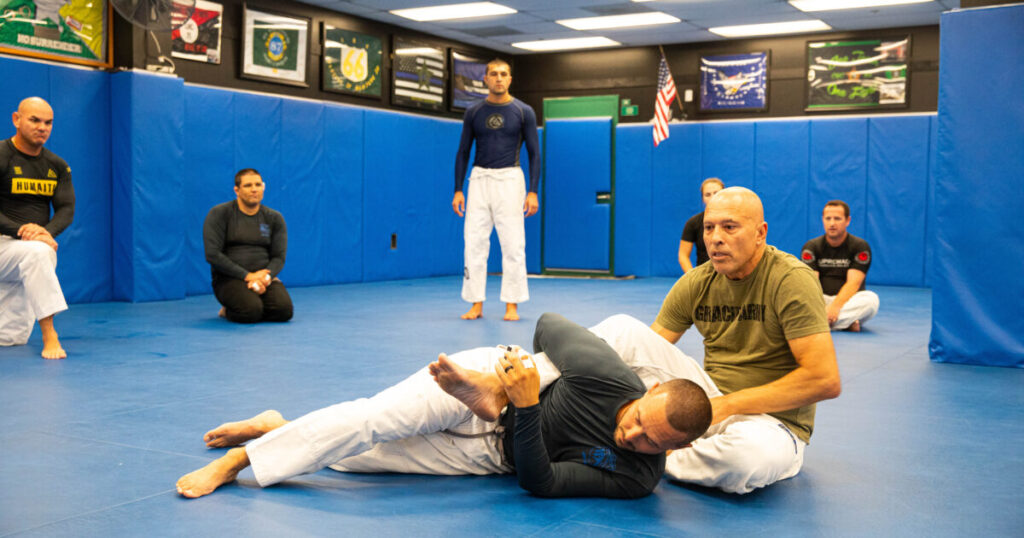Royce Gracie, widely regarded as one of the most influential figures in mixed martial arts, recently taught local police officers a Brazilian Jiu-Jitsu class with an emphasis on building confidence and defense.
He and his last name are synonymous with mixed martial arts (MMA). His family has been pioneers of Gracie Jiu-Jitsu, a self-defense style of martial arts, for over 80 years. Rorion Gracie was a co-founder of the Ultimate Fighting Championship in 1993, and Royce won the first, second and fourth multi-fight tournaments when the league did away with weight classes and most of its rules.
Gracie led a seminar hosted by the Suncoast Police Benevolent Association (PBA) on July 19, whose purpose was to teach area officers how to physically subdue uncooperative suspects without using weapons.
The seminars are akin to Michael Jordan helping local police officers practice their jump shots, but PBA president Jonathan Vazquez pointed out that lives are at stake.
“Instead of using a gun or a Taser or an ASP (extendable baton), I can use what God gave me,” Vasquez said. “My hands, my feet, and I can control people with those skills.”
Vasquez, a police dog trainer with the St. Petersburg Police Department and former military officer, said police officers don't typically receive training in Brazilian Jiu-Jitsu (BJJ), but he hopes these seminars will “light a fire” and encourage participants to share the benefits within their own agencies.
Martial arts, particularly Gracie Jiu-Jitsu, were designed to help smaller people subdue larger attackers, and a key element of the PBA's program is to instill confidence when faced with a real or perceived threat and not rely solely on firearms or non-lethal weapons that could result in serious injury or death.
Vazquez said Brazilian Jiu-Jitsu can develop the mental and physical ability to control an attacker “without using the tools you already have.” He reiterated that the PBA wants to help police officers protect themselves and their communities.
“We're really proactive,” Vasquez said. “We really look out for them on and off the clock, in their daily lives. By providing this training, we're giving them another tool…”


Royce Gracie (right, center) proved in the early days of the UFC that his clan's jiu-jitsu could help him beat bigger opponents.
Like many millennial mixed martial arts fans, Vazquez has been following Gracie since the 1990s. He was mowing his lawn when a podcast interview caught his eye and he learned that the UFC Hall of Famer had recently moved to Sarasota from California.
“I knew that this was my chance, I'd take the plunge and give it a go,” said Vasquez, who also knew Gracie's son was in the military and had a connection with emergency medical personnel.
“Brazilian Jiu-Jitsu is extremely important to our community,” Vazquez told Gracie in a social media message, explaining that “learning from a master” would motivate participants to continue training.
“I think his (Gracie's) exact words were, 'You took the words right out of my mouth,'” Vasquez added. “He's probably got reserve sheriff status in just about every state in the country.”
Vasquez said participants from across Pinellas County were “astonished,” and leaders from various agencies asked the PBA to re-enact and film what they learned to share with their officers.
Gracie told Vazquez he'd be back for the next training session, which was being held at St. Petersburg University's Allstate Center, and Vazquez believes Gracie's attendance and blessing helped validate the PBA's efforts.
“We believe this will keep the officers out of trouble,” Vasquez said. “At the very least, it will keep the media away from them. It makes a lot more headlines when an officer subdues someone with their hands instead of pulling out a Taser or a gun.”
“For our officers and for the community.”


From left: St. Petersburg College (SPC) Human Services Program Director Dr. LaTresha Moore, Suncoast Police Benevolent Association (PBA) President Jonathan Vasquez, SPC Chairman Dr. Tonjua Williams, Congresswoman Linda Cheney, Suncoast PBA Executive Director Sasha Rohn and Dr. Joseph Smiley, Dean of the School of Social and Behavioral Sciences and Human Services, at SPC Midtown Campus in August 2023. Photo by Mark Parker.
It's not like my grandfather's PBA.
The PBA ensures officers earn competitive wages and receive necessary benefits, and it also provides legal assistance and support to the families of those killed in the line of duty, but as Executive Director Sasha Rohn points out, the local association is “not your grandfather's law enforcement union.”
She shared this mantra in August 2023 after helping to found Florida's first advanced collegiate program to help police officers overcome internal and external mental health challenges. “We're all for our members,” Vasquez said Thursday.
“I'm not a retired union president. We're not an Elks Lodge.”
Roan comes from a military family and served as SPPD's general counsel, and while Vasquez described him as “relatively junior,” he has 17 years of experience in local law enforcement, including five as a military police officer.
Vasquez said the two love “the job” and the people they represent. They see where some agencies are “a little lacking” for a variety of reasons and work to fill those gaps, Vasquez said.
“We're creative. We're always thinking about what we can do to help our members,” he said. “If they continue to hone these skills, they'll be better and safer police officers.”

